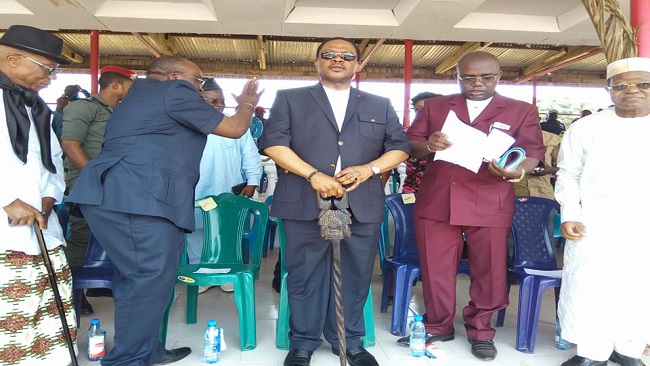Categories
Recent Posts
- Football: Dembele goal gives PSG narrow advantage over Arsenal in Champions League
- US: Trump addressing rally in Michigan as he marks 100 days in office
- Vatican: Conclave to elect new pope will start on May 7
- Namibian minister sacked after being accused of rape
- Dozens of African migrants killed in US strike on Yemen
Archives
- April 2025
- March 2025
- February 2025
- January 2025
- December 2024
- November 2024
- October 2024
- September 2024
- August 2024
- July 2024
- June 2024
- May 2024
- April 2024
- March 2024
- February 2024
- January 2024
- December 2023
- November 2023
- October 2023
- September 2023
- August 2023
- July 2023
- June 2023
- May 2023
- April 2023
- March 2023
- February 2023
- January 2023
- December 2022
- November 2022
- October 2022
- September 2022
- August 2022
- July 2022
- June 2022
- May 2022
- April 2022
- March 2022
- February 2022
- January 2022
- December 2021
- November 2021
- October 2021
- September 2021
- August 2021
- July 2021
- June 2021
- May 2021
- April 2021
- March 2021
- February 2021
- January 2021
- December 2020
- November 2020
- October 2020
- September 2020
- August 2020
- July 2020
- June 2020
- May 2020
- April 2020
- March 2020
- February 2020
- January 2020
- December 2019
- November 2019
- October 2019
- September 2019
- August 2019
- July 2019
- June 2019
- May 2019
- April 2019
- March 2019
- February 2019
- January 2019
- December 2018
- November 2018
- October 2018
- September 2018
- August 2018
- July 2018
- June 2018
- May 2018
- April 2018
- March 2018
- February 2018
- January 2018
- December 2017
- November 2017
- October 2017
- September 2017
- August 2017
- July 2017
- June 2017
- May 2017
- April 2017
- March 2017
- February 2017
- January 2017
- December 2016
- November 2016
- October 2016
- September 2016
- August 2016
- July 2016
- June 2016
Featured
Most Commented Posts
 4 Anglophone detainees killed in Yaounde
4 Anglophone detainees killed in Yaounde
18 comments Chantal Biya says she will return to Cameroon if General Ivo Yenwo, Martin Belinga Eboutou and Ferdinand Ngoh Ngoh are sacked
Chantal Biya says she will return to Cameroon if General Ivo Yenwo, Martin Belinga Eboutou and Ferdinand Ngoh Ngoh are sacked
13 comments The Anglophone Problem – When Facts don’t Lie
The Anglophone Problem – When Facts don’t Lie
12 comments Anglophone Nationalism: Barrister Eyambe says “hidden plans are at work”
Anglophone Nationalism: Barrister Eyambe says “hidden plans are at work”
12 comments Largest wave of arrest by BIR in Bamenda
Largest wave of arrest by BIR in Bamenda
10 comments
Latest Tweets
Featured
-

Football: Dembele goal gives PSG narrow advantage over Arsenal in Champions League
-

US: Trump addressing rally in Michigan as he marks 100 days in office
-

Vatican: Conclave to elect new pope will start on May 7
-

Namibian minister sacked after being accused of rape
-

Dozens of African migrants killed in US strike on Yemen
-

Manyu Division: A new path is possible
-

Who will be the next pope? Key candidates in an unpredictable process
© Cameroon Concord News 2025





8, March 2018
UN says Biya regime must de-escalate Anglophone crisis, allow human rights monitors 0
The United Nations Human Rights chief has stressed that it is in the interest of the Cameroonian government to de-escalate tensions arising from the Anglophone crisis.
In an oral update by Zeid Ra’ad Al Hussein to the 37th session of the Human Rights Council on March 7, 2018; he added that his office had yet to be granted access to monitor rights violations.
His address also addressed the arrest of Anglophone leaders in Nigeria and their subsequent deportation to Cameroon, where they are yet to be put before court. The U.N. has criticized the move saying it violated international principles.
The Anglophone regions remain under curfew imposed by their respective governors. The curfews have been imposed supposedly to allow security forces to contain attacks by armed separatists on members of the security forces.
About 24 members of the security forces – the military, police and gendarmes – have so far been killed in guerilla style attacks especially at checkpoints. The separatists have also reported having kidnapped two government officials.
The government still maintains that there is security in the regions but recently created a fifth military region in the capital of the North West region, Bamenda. The move was seen as a means to face off with the separatists.
The separatists under the so-called Ambazonia Republic have since October 2017 attempted to breakaway from French-majority Cameroon. There has been international calls for dialogue to end the crisis which has also created a humanitarian situation with people fleeing into Nigeria.
Zeid Ra’ad Al Hussein’s full observation on Cameroon
“In Cameroon, what appears to be long-standing structural discrimination in the Anglophone region of the country has led to continuing clashes between security forces and separatist groups.
“The arrest, in Nigeria, of 47 Anglophone community leaders, and their extradition to Cameroon has reportedly led to renewed violence in the south-west and north-west of the country.
“Allegations of summary executions of civilians by members of the security forces have been reported, and are generating widespread resentment. I regret that my Office has not been given access to verify these allegations.
“Acknowledging the complex challenges facing the authorities – including renewed displacement from the Central African Republic and the increase in Boko Haram attacks in the north – I urge the Government to make every effort to de-escalate the conflict in the Anglophone regions, and to allow unimpeded access to human rights monitors so that accurate information on the situation can inform constructive engagement on the way forward.”
Source: Africa News